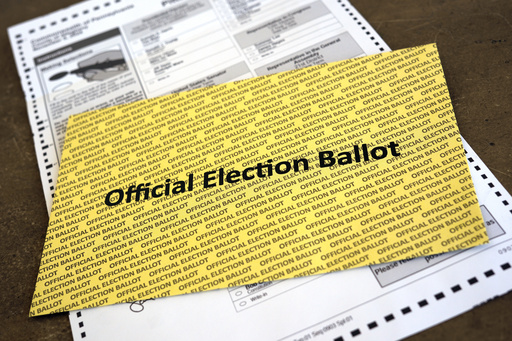
Local election authorities in Pennsylvania have reported that ballots sometimes arrive in less-than-ideal conditions. Instances of damage such as rips, coffee stains, or even burned edges have been noted. In these cases, officials are able to create a duplicate of the ballot to ensure that all votes are accurately counted by the election equipment.
The procedure known as “ballot duplication” involves taking a ballot that has been damaged to the extent that it is unscannable by voting machines and transferring the votes onto a new, pristine ballot that can be processed. The initial ballot is retained throughout this operation. This method is also applied if voters make marking errors, such as using inappropriate writing implements.
“There are always some ballots every election cycle that end up being damaged or unscannable, whether it’s due to a tear or a liquid spill that causes the scanner to fail. There are numerous reasons why a ballot requires duplication,” commented Seth Bluestein, a Philadelphia City Commissioner who is part of the team supervising the city’s elections. “Any ballot that cannot be read by the tabulation machines must undergo this process.”
According to the National Conference of State Legislatures, ballot duplication is practiced in 42 states, including Pennsylvania. All these states implement duplication for compromised ballots, and 31 of them carry out duplication for both damaged and incorrectly marked ballots, like those featuring stray marks.
Tammy Patrick, chief program officer at the National Association of Election Officials and a former official in Arizona’s Maricopa County, noted that she has come across various types of damaged and improperly marked ballots throughout her career.
“I’ve literally seen ballots that were chewed up by dogs. I’ve encountered every kind of marking, from crayon to lipstick to eyebrow pencil. These unusual markings are not typically readable by voting systems,” she explained.
In Berks County, ballot duplication primarily applies to mail-in and absentee ballots, as the county utilizes ballot marking devices during in-person voting. According to Stephanie Nojiri, the assistant director of elections for Berks County, while it is uncommon for mail or absentee ballots to be returned in a damaged state, it does occur. Sometimes ripped ballots can be taped together and successfully scanned, though in other situations, officials must recreate the entire ballot, Nojiri added.
Different counties in Pennsylvania employ various procedures for this process. For example, Berks County uses a ballot marking device to reproduce damaged ballots, while officials in Philadelphia manually reconstruct them. Election workers in Philadelphia carry out the ballot duplication process, and observers from political parties or candidates are allowed to monitor the proceedings, as noted by Commissioner Bluestein.
According to state law in Pennsylvania, election officials cannot open mail or absentee ballots before 7:00 a.m. on Election Day. Consequently, Philadelphia election officials must wait to process any mail ballots that are visibly damaged, Bluestein stated.
“There’s nothing we can do about those until after the polls open on Election Day,” he remarked.
Patrick affirmed that the ballot duplication methods used are both verifiable and reliable.
“All actions are documented, recorded, and can be audited or reviewed. This is not a random process where they just mark ballots and submit them. Each reconstructed ballot is specifically tied to the original one,” she indicated. “You can always refer back to the original ballot for comparison, ensuring that the team marked the duplicates correctly.”
